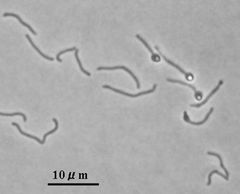
Copyright NILGS
Japan's National Institute of Livestock and Grassland Science (NILGS), National Agriculture and Food Research Organization, announced on August 4, 2010, that it had successfully isolated an extremely thermophilic anaerobic xylan-degrading bacterium from sheep feces through joint research with the University of Georgia in the United States. This bacterium can even grow at temperatures above 70 degrees Celsius and degrade xylan, a component of hemicelluloses included in straw and other agricultural waste. This is the world's first isolation of thermophilic anaerobic bacterium whose growth rate is highest at or above 65 degrees Celsius, from livestock feces.
The research group inoculated sheep feces into a culture medium containing xylan, cultured it at 74 degrees Celsius in anaerobic conditions, and then isolated the new xylan-degrading bacterium. Growing on xylan as a source of carbon and energy, the bacterium can degrade various kinds of xylan such as xylans from beech or oak trees to xylose which can be used in making biofuel. Its growth ranges are 44 to 77 degree Celsius (70 degrees Celsius is the optimal temperature) and pH 5.9 to 8.6 (optimum 7.2) in anaerobic conditions.
The bacterium was named Caldicoprobacter oshimai and certified as a new family. A family is positioned above a genus, which is above a species. The bacterium strain was sent to the ATCC and DSMA, located in the USA and Germany, respectively. The strain can be used for nonprofit purposes.
NILGS expects that the new bacterium will promote the use of previously unused biomass such as straw as biofuel, and also be used as a new genetic resource.
National Institute of Livestock and Grassland Science official websitehttp://nilgs.naro.affrc.go.jp/index-e.html

No comments:
Post a Comment